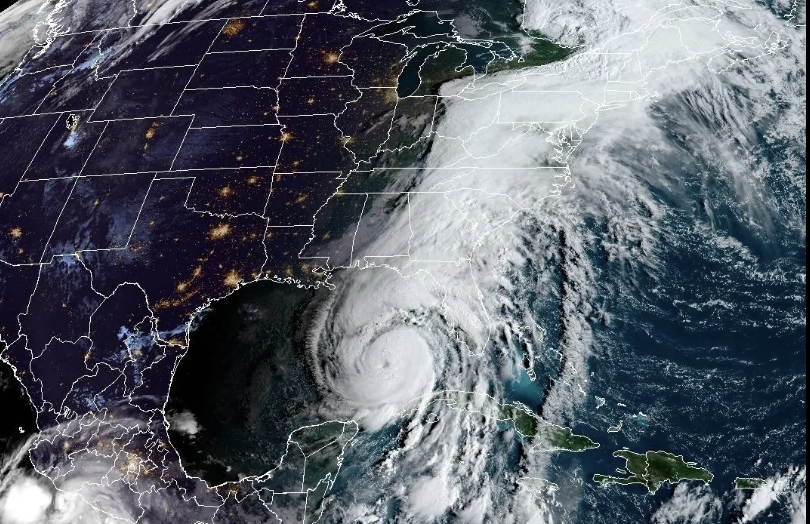Hurricanes such as Milton and Helene have overtaken southern states including Georgia, Florida, Tennessee, North Carolina, South Carolina, and Virginia and massively impacted people’s daily lives; schools have shut down, power has gone out, and death tolls are rapidly increasing. With upwards of 150 homes destroyed, record-breaking wind speeds, and more, the complete and utter devastation caused by these storms is catastrophic.
These impacts have proven incredibly detrimental to communities in a myriad of ways—counties such as Pinellas and Hillsborough in Florida have experienced numerous road and bridge closures, the Tampa International Airport has discontinued operations for the time being, and universities have closed or suspended certain campuses as a result of Hurricane Helene, noted CBS News. Moreover, reported that Hurricane Milton has flooded neighborhoods, entirely deteriorated homes, and ruptured power, leaving nearly 1.3 million customers without service. This damage varied depending on the county; “In St. Petersburg, winds gusting to more than 100 miles an hour tore part of the roof off Tropicana Field, the home stadium of the Tampa Bay Rays, and smashed a 500-foot construction crane onto a building housing the offices of The Tampa Bay Times,” wrote NYT.
Executive Order (EO) 24-214 has been issued, granting state-emergency status in 51 counties with hopes of quicker emergency relief for citizens. Furthermore, updates on state response and recovery efforts have been equipped. The Florida Division of Emergency Management (FDEM) has gathered over 730,000 gallons of emergency fuels, including roughly 51,500 gallons of diesel and 35,900 gallons of gas, which have been sent to the field to assist operations, according to Governor Ron DeSantis.
The horror of such devastation has extended to Westchester, as students and teachers alike have seen or heard news reports regarding the matter, and it is evident that the information has left many troubled. “These storms have had such a significant impact on everyone—from the obvious people in Florida who are directly affected by it to anyone who hears about it. The side effects are undeniably tragic,” says Jesse Fried, a sophomore at Greeley. “With everything I’ve heard about the storms, whether it be from my parents, on TikTok, or on the actual news, I can undoubtedly say that anyone would be completely distraught over this information.”
According to CNN, Asheville, North Carolina, the epicenter of Hurricane Helene, is still suffering from a multitude of ramifications, including washed out roads and bridges, cell service/power outages, and blackouts. Additionally, according to Mayor Esther Manheimer of Asheville, close to 600 citizens are still unaccounted for and therefore presumed missing as a result of the destruction. Mayor Manheimer, accompanied by President Biden, flew over the city and has reported that relief and assistance is set to be coming from the Federal Emergency Management Agency (FEMA), who already have over 1000 staff members working to address the states affected by the Hurricanes. They have also delivered 1 million liters of water and 600,000 meals in North Carolina.
The impacted states are doing everything they can to efficiently and effectively provide aid. Senators from North Carolina, Virginia, Tennessee, Florida, South Carolina, and Georgia signed a letter addressed to Senate leadership and top appropriations officials, which are senators tasked with the job of writing spending bills. They wrote that greater tragedy may be anticipated due to lack of cell service, as it is difficult to grasp all the details of the disaster without adequate communication methods. Despite these obstacles, officials are doing their best to alleviate some of the distress and reconstruct the areas most seriously hit; “Although the true level of devastation is still unfolding, it is clear that Congress must act to meet the unmet needs in our states and address the scope and scale of destruction experienced by our constituents,” wrote the senators. It is expected that much attention will continue to be given to these extenuating circumstances.
Opportunities for assistance have been given in countless ways. From the activation of the Disaster Information Reporting System (DIRS) by the Federal Communications Commission (FCC) as a result of Helene’s affliction of communications, to financial assistance provided by the U.S. government, including the U.S. Securities and Exchange Commission (SEC) monitoring Helene’s impact on capital markets and investors. These impacts are incredibly significant and relief is certainly not in short supply as organizations like FCC, FDEM, and FEMA are actively addressing the crisis. However, relief is hard to come by with such widespread damage. “I continuously hear information about the matters in the south and the possibility of relief, but the circumstances have still yet to be reduced in the way that they need,” says Fried. “It is unbelievably devastating that no matter how much aid is provided, hardly anything is enough to sufficiently fix the damage.” There is no exact timeline for the required repair, but the Biden-Harris Administration approved the distribution of $825 million to survivors and communities of Helene. With hope, we will see much progress in the coming weeks and months.

